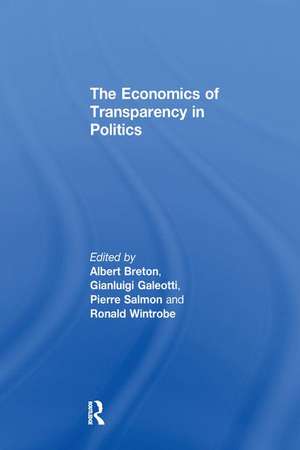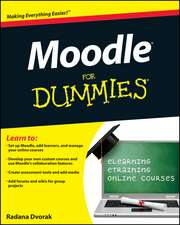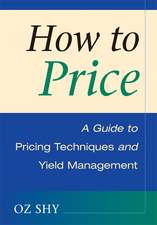The Economics of Transparency in Politics
Autor Gianluigi Galeotti Editat de Albert Breton Autor Ronald Wintrobeen Limba Engleză Paperback – 27 feb 2017
| Toate formatele și edițiile | Preț | Express |
|---|---|---|
| Paperback (1) | 469.34 lei 6-8 săpt. | |
| Taylor & Francis – 27 feb 2017 | 469.34 lei 6-8 săpt. | |
| Hardback (1) | 1054.71 lei 6-8 săpt. | |
| Taylor & Francis – 15 mar 2007 | 1054.71 lei 6-8 săpt. |
Preț: 469.34 lei
Nou
Puncte Express: 704
Preț estimativ în valută:
89.82€ • 93.43$ • 74.15£
89.82€ • 93.43$ • 74.15£
Carte tipărită la comandă
Livrare economică 12-26 aprilie
Preluare comenzi: 021 569.72.76
Specificații
ISBN-13: 9781138277663
ISBN-10: 1138277665
Pagini: 248
Dimensiuni: 156 x 234 x 13 mm
Greutate: 0.45 kg
Ediția:1
Editura: Taylor & Francis
Colecția Routledge
Locul publicării:Oxford, United Kingdom
ISBN-10: 1138277665
Pagini: 248
Dimensiuni: 156 x 234 x 13 mm
Greutate: 0.45 kg
Ediția:1
Editura: Taylor & Francis
Colecția Routledge
Locul publicării:Oxford, United Kingdom
Cuprins
Contents: Introduction, Albert Breton, Gianluigi Galeotti, Pierre Salmon, and Ronald Wintrobe. Part 1 In Democratic Contexts: Acquiescence to opacity, Pierre Salmon and Alain Wolfelsperger; Citizens' Knowledge, Politicians' Duplicity, Russell Hardin; Transparency and efficiency, Albert Breton. Part 2 In International Settings: The Artist as a Secret Agent: Liberalism Against Populism, Manfred J. Holler; Jihad vs. McWorld: A Rational Choice Approach, Ronald Wintrobe. Part 3 Corruption: Invisible Feet and Grabbing Hands: the Political Economy of Corruption and Welfare, Johann Lambsdorff; Information, Corruption, and Measures for the Promotion of Manufactured Exports, Glenn P. Jenkins and Chun-Yan Kuo. Part 4 Government Behavior: Cases for and Against Transparency/Obfuscation in Intergovernmental Relations, Giorgio Brosio; Transparency in the Budget Process of a Bureaucratic Organization: A Principal-Agent Model of Budgeting, Louis M. Imbeau; Redistribution, Decentralization, and Constitutional Rules, Federico Etro and Piero Giarda. Index.
Notă biografică
Albert Breton is Emeritus Professor in the Department of Economics, University of Toronto, Canada. Much of his research has been and continues to be on the application of neo-classical economics to issues such as federalism and decentralization. Gianluigi Galeotti is Professor of Public Economics at the University of Rome (La Sapienza), Italy. He has worked on the economics of political behavior and now works on a neo-institutional approach to Law and Economics. Pierre Salmon is a member of the Laboratoire d'Economie et de Gestion, a research team of the Université de Bourgogne, France, where he is now professor emeritus. He formerly taught at the Universities of Rennes and Paris and at the European University Institute in Florence. Ronald Wintrobe is Professor of Economics at the University of Western Ontario, Canada, and co-director of the Political Economy Research Group. He has published many books and articles in professional journals.
Recenzii
'Transparency has become a mantra for many policy reformers. But the matter is surely not straightforward, as reflection on the virtues of the secret ballot quickly shows. The papers in this volume explore the large territory between transparency and obfuscation from both positive and normative perspectives.' Stanley L. Winer, Carleton University, Canada '...[this] volume raises many important issues and draws attention to many of the benefits and costs associated with transparency.' Public Choice
Descriere
The purpose of this book is to formulate and discuss positive (as distinguished from normative) rational choice models of the advantages and costs of transparency in various areas of public sector activity and to assess what is in effect the social level of obfuscation in politics that results from rational behaviour.













